Imperative cooking: fear in the high street
!6-141101‘41*.— THERE'S a rather good little book out by a lady called Tana Wells. It is a useful com- pendium of all the barmy people and ideas which beset any gentleman or lady today intent on civilised pleasures. Miss Wells brings together an extraordinary cast: the Lifestyle Police, the False Alarmists, the Culturally Correct Corporation, the Rights Brigade and the Self-Tort Cry-babies. Even better is her unifying theme, the bile which animates this ghastly crew. Using a term invented by the late Henry Fairlie, she calls her compendium Fear of Living. If you want one word to explain so many people's incompetence at cooking and eat- ing, 'fear' is a good start. Fear lies behind the healthists' pathetic attempt to add another few weeks to their miserable lives by not eating or drinking this or that. But fear also pervades the high street. That dithering housewife who is always ahead of one in the butcher: 'Ooh, what shall I have?"Well, madam, there's a well-hung rib of beef, legs of pork are reasonable, what about some pig's liver?"0oh, no, I'm not sure, I don't know, have you got a smaller one? Ooh, I don't know if Bob would eat it . .
In this column I've mocked these dither- ers, their ignorance, lack of interest and moral commitment to buying and cooking the best for their families, but never noticed quite how terrified they are. They don't behave like this in the paper shop, the dress shop or the chemist's. Even in the supermarket, where they look miserable, they don't look scared out of their wits, perhaps because so much is pre-packaged they don't have to ask for anything, negoti- ate a cut or whatever and so publicly dis- play their ignorance. The only place that's more intimidating than the butcher is the fish shop. I've often remarked the extreme reluctance of many Englishwomen and Englishmen to enter proper fish shops but till now never quite grasped the fear behind it. Last weekend I went out and watched, watched them as they passed by. Go out and have a look yourself if you don't believe me. As they walk by the slab, they move out nearer the kerb and sort of flinch. Occasionally they peer from a distance. One impetuous soul might ask, 'What's that there?' then quickly retreat alarmed at her own rashness. I saw one lady shudder. The nearest thing to it is the way respectable men pass sex aid shops. Is it not fear that explains the 'Can't Brigade'? You remember, the people who bleet, 'I can't eat offal,' I can't eat fish with bones,' I can't eat seafood,' the drips who say, `Urgh, I couldn't' or 'How could you?' when offered tripe or snails or brains or blood, the voting, child-bearing and other- wise grown-up adults who cannot bear to touch a rabbit in the fur, handle a macker- el's gills to see how fresh it is, or smell a widgeon's bottom to see if it can be hung another few days.
The children of the world's greatest empire are petrified by the wares of a fish- ing boat or the flesh and blood that is the stuff of nature, frit of fur, feather, slime, skin, intestines, bones, and sniffy about smells: `Urrgh!' The descendants of Drake and Nelson blanch when asked to clean a herring.
My only quarrel with Miss Wells and the fear analysis is that the implication tends to be that what is really feared is liberty itself. The proper stance, it is suggested, is boldly to confront the risky world, manfully accept the bracing climate of hazard and stoically accept responsibility for the consequences of choices: the shopper as hero. I can only say that is not what I feel like in the butch- er's. I behave in the fishmonger's much as my father did, much as many French and Italians do. And they certainly aren't heroes (the Frogs and Eyeties, that is). It's silly to put the competence of Spanish shoppers in their markets down to valour. Sensible chaps don't want to make bracing new choices anyway; the old choices are quite good enough. They have merely to be repeated. What is wrong with the meddlers is not that they threaten the liberty to buy novelties but that they would stop us doing what good cooks and shoppers have done for years. The argument against the med- dlers is conservative not libertarian.
Doing what has been found to be the best, what one does every Friday, does not demand any courage at all. So the fact that bad cooks in England are often cowards does not mean that good ones are heroes. However, it does require a spot of courage to turn oneself from a bad cook and eater into a good one. The first time you paunch a rabbit, a little nerve is needed. In that sense guts does require guts. More guts than Albion has got.
Digby Anderson


























































 Previous page
Previous page